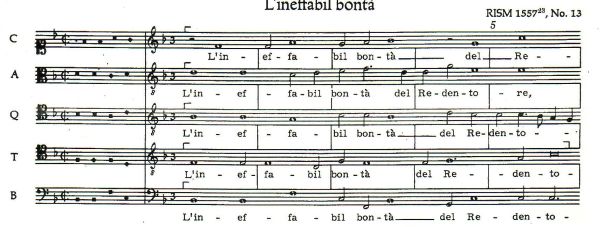| Version imprimante |
La musique de Cipriano De Rore
L'ineffabil bontà
A. Type:
Madrigaal
B. Nombre de voix:
5vv
C. Auteur du texte:
Ariosto, Ludovico
Ct. Texte:
(avec traduction en Néerlandais Anglais)
: Lire
E. Se trouve dans les sources de partitions suivantes:
suivant: CMME Project(The) - Dumitrescu (e.a.), Theodor :
-
{Census} - ParisBNC 851 ("Bourdeney Manuscript")
: '{Census} - ParisBNC 851 ("Bourdeney Manuscript")'
suivant: Huys, Bernard (1965) :
-
1557 :
{Huys} - 384
: 'RORE (Cyprien de). Il quarto libro d'i madregali a cinque voci con uno madregale a sei & uno dialogo a otto. Novamente da lui composto & per Antonio Gardano stampato & dato in luce.'
-
1563 :
{Huys} - 385
: 'RORE (Cyprien de). Il quarto libro di madrigali a cinque voci con uno madregale a sei & uno dialogo a otto. Novamente ristampato.'
suivant: Lewis, Mary S. (1997) :
-
1557 :
{Lewis_2} - 232
: 'RORE. IV° LIBRO D'I MADRIGALI'
suivant: Lewis, Mary S. (2005) :
-
1563 :
{Lewis_3} - 323
: 'CANTO (TENORE, BASSO, QVINTO) | Dl CIPRIANO DE RORE | IL QVARTO LIBRO Dl MADRIGALI | A CINQVE VOCI CON VNO MADREGALE | a sei & uno Dialogo a otto, Nouamente Ristampato. | A CINQVE (Drz) VOCI | CON GRATIA ET PRIVILEGIO. | In Venetia appresso di | Antonio Gardano. | 1563.'
suivant: Meier, Bernardus (1969) :
-
1557 :
{RISM} - 1557_23
: 'Di Cipriano de Rore il quarto libro d'i madregali a cinque voci con uno madregale a sei e uno dialogo a otto, novamente da lui composto et per Antonio Gardano stampato et dato in luce.'
suivant: Vogel, Emil (1892 (2de uitg., 1977)) :
-
1557 :
{Vogel} - 25
: '(1557) TENOR | DI CIPRIANO DE RORE | IL QVARTO LIBRO Dl MADREGALI | A cinque Voci con uno Madregale a sei & uno dialogo a otto, Nouamente da lui | composto & per Antonio Gardano stampato & dato in luce | CON GRATIA ET PRIVILEGIO | A CINQVE (Drz) VOCI | In Venetia Apresso di | Antonio Gardano. | 1557.'
-
1557 :
{Vogel} - 25
: '(1557) TENOR | DI CIPRIANO DE RORE | IL QVARTO LIBRO Dl MADREGALI | A cinque Voci con uno Madregale a sei & uno dialogo a otto, Nouamente da lui | composto & per Antonio Gardano stampato & dato in luce | CON GRATIA ET PRIVILEGIO | A CINQVE (Drz) VOCI | In Venetia Apresso di | Antonio Gardano. | 1557.'
-
1563 :
{Vogel} - 27
: '(1563) CANTO | Dl CIPRIANO DE RORE | IL QVARTO LIBRO Dl MADRIGALI | A CINQVE VOCI CON VNO MADREGALE | a sei & uno Dialogo a otto, Nouamente Ristampato. | A CINQVE (Drz) VOCI | CON GRATIA ET PRIVILEGIO. | In Venetia appresso di | Antonio Gardano. | 1563.'
-
1563 :
{Vogel} - 27
: '(1563) CANTO | Dl CIPRIANO DE RORE | IL QVARTO LIBRO Dl MADRIGALI | A CINQVE VOCI CON VNO MADREGALE | a sei & uno Dialogo a otto, Nouamente Ristampato. | A CINQVE (Drz) VOCI | CON GRATIA ET PRIVILEGIO. | In Venetia appresso di | Antonio Gardano. | 1563.'
-
1580 :
{Vogel} - 28
: '(1580) TENORE | DI CIPRIANO DE RORE | IL QVARTO LIBRO DE MADRIGALI | A CINQVE VOCI, Nuouamente Ristampato. | (Drz) | In Venetia appresso | Angelo Gardano | 1580.'
F. Partition moderne:
See 'Meier, Bernardus : Cipriani Rore Opera Omnia, Vol IV : Madrigali 3-8 vocum' : p.105
I. Incipit:
 Source:
'Meier, Bernardus : Cipriani Rore Opera Omnia', American Institute of Musicology
Source:
'Meier, Bernardus : Cipriani Rore Opera Omnia', American Institute of Musicology
J. Discographie:
1 - ' Cipriano De Rore - Portrait of the Artist as a Starved Dog (graindelavoix) , Graindelavoix, Björn Schmelzer (Glossa)L. Références:
Références avec citation/commentaire:
1 : Einstein, Alfred,
The Italian Madrigal (vertaald naar het Engels door Alexander H. Krappe, Roger H. Sessions en Oliver Strunk)
(Princeton University Press, New Jersey, 1949)
- p.390-391
: 'When Rore sets the first stanza in canto XIX of the Orlando furioso : Alcun non può saper it is an homage to the house of Este in the sense intended by the poet, himself a servant of the family, though a poorly paid one. And in the following stanza (Orlando furioso, XLIII, 62) the intension is unmistakable: L'ineffabel bontà this is a prayer for Ferrara and the Estes, a prayer that unfortunately remained unanswered. In setting this text, Rore made use of so strange a combination of artifice and epigrammatic brevity that one might think the piece designed for the beginning or end of some pefuntiory court ceremony.' (+ complete text of the poem)
Page (re)travaillée la dernière fois :
30/06/2022 20:08:55
Mon code :
#5784 (M_4_105)